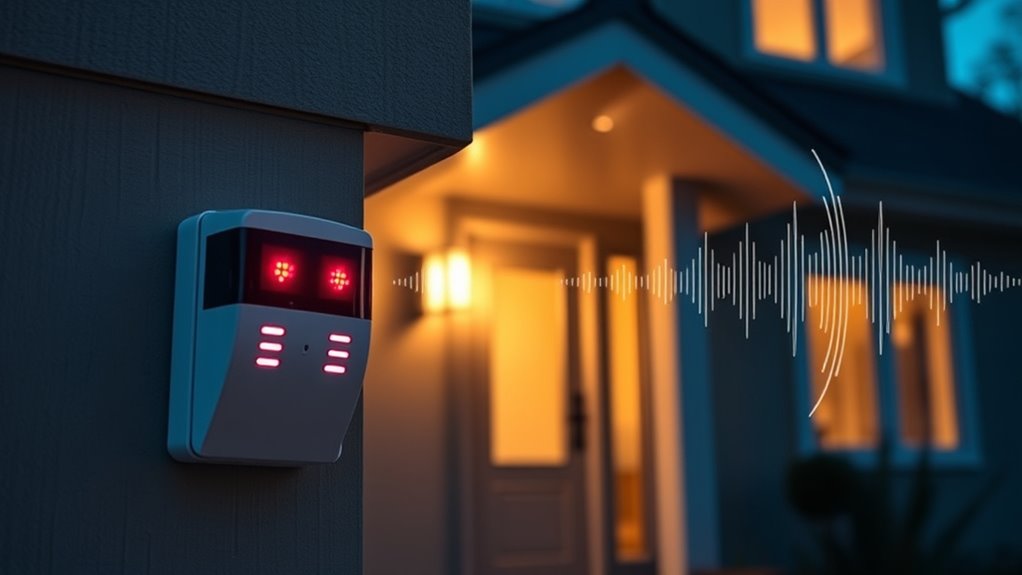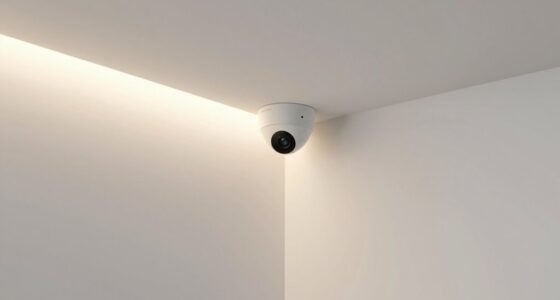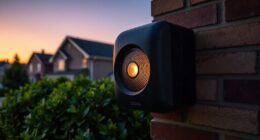Signal jamming can disrupt your home alarm’s ability to send alerts, making your system “deaf” during emergencies. It blocks communication signals intentionally or through electronic interference, preventing alarms from alerting you or authorities. Combined with power disruptions, jamming can leave your home unprotected when you need it most. Understanding how these threats work helps you plan better defenses, so you can stay one step ahead of potential vulnerabilities—if you want to learn how to protect yourself effectively, keep exploring.
Key Takeaways
- Signal jamming prevents alarm systems from transmitting alerts to monitoring centers or apps.
- Electronic devices like Wi-Fi routers and cordless phones can unintentionally interfere with alarm signals.
- Power disruptions weaken alarm system communication, especially during outages or electrical faults.
- Combined interference and power loss can render home alarms completely ineffective.
- Using backup power and frequency-hopping technology enhances alarm resilience against jamming.

Signal jamming is a growing concern for homeowners relying on wireless alarm systems, as it can prevent your security devices from communicating with monitoring centers or mobile apps. When someone intentionally disrupts your signals, your alarm system becomes fundamentally deaf to alerts, making it vulnerable to intruders or emergencies. This disruption often stems from wireless interference, which occurs when other electronic devices or deliberate jamming devices emit signals on the same frequency bands your alarm uses. As a result, your system’s ability to send or receive critical alerts is compromised, leaving your home unprotected during a break-in or fire. Wireless interference can happen unintentionally from household gadgets like cordless phones, Wi-Fi routers, or microwave ovens, but it can also be maliciously used to block signals intentionally. Such interference can create gaps in your security coverage, giving intruders an opportunity they might not otherwise have.
Power disruption is another key aspect of signal jamming that can severely weaken your alarm system. When power is cut or disrupted, your wireless devices may lose their connection to the monitoring center or fail to send alerts. Many alarm systems rely on a steady power source, and if that source is interrupted, the system’s communication capabilities are compromised. Power disruptions can be caused by electrical outages, faulty wiring, or deliberate tampering, such as cutting power lines or disabling backup batteries. If your system’s backup power isn’t sufficiently robust, even a brief power outage could mean your alarm becomes silent or unresponsive, leaving your home exposed. Combining power disruption with wireless interference can make your alarm system almost impossible to rely on, especially if both are targeted simultaneously. This dual threat can cause your security system to become completely ineffective at the worst possible moment.
Understanding how wireless interference and power disruption work together helps you grasp the importance of safeguarding your alarm system. You need to be aware of potential sources of interference within your home, including electronic devices that operate on similar frequencies. Additionally, ensuring your system has reliable backup power solutions helps maintain communication during outages. Investing in systems that use encrypted or frequency-hopping signals can also reduce vulnerability to jamming attempts. Regularly testing your alarm’s communication pathways and staying alert to unusual disruptions will make it easier to identify if someone is attempting to jam or disrupt your signals. Protecting your home from signal jamming involves more than just installing an alarm; it requires ongoing vigilance and proactive measures to keep your security system resilient against interference and power disruptions. Being aware of home security system features can help you choose equipment that is more resistant to such threats.
Frequently Asked Questions
How Can I Detect if My Alarm System Is Being Jammed?
You can detect if your alarm system is being jammed by monitoring for radio interference or unusual signals. If your alerts go offline unexpectedly or you notice inconsistent device responses, it’s a sign of possible jamming. Conduct device troubleshooting by checking connections and signal strength. Consider installing a jammer detector or consulting security professionals to guarantee your system’s signals are clear and secure from interference.
Are Certain Alarm Systems More Resistant to Signal Jamming?
Did you know that 75% of advanced alarm systems feature enhanced signal resilience? Some alarm systems are more resistant to signal jamming because they utilize robust alarm encryption and multiple communication channels, making it harder for intruders to disrupt. These systems automatically switch between Wi-Fi, cellular, and backup networks, ensuring continuous protection. Investing in such technology considerably reduces the risk of jamming and keeps your home secure.
What Legal Measures Exist Against Signal Jamming Devices?
Legal enforcement strictly prohibits signal jamming devices, and regulatory standards are in place to prevent their use. Authorities actively monitor and penalize individuals or companies that deploy jamming tools, as they interfere with communication systems and compromise safety. You should be aware that distributing or using such devices is illegal in many regions, and enforcement agencies take these violations seriously, ensuring your home security remains protected by lawful measures.
Does Signal Jamming Affect Wireless or Wired Home Alarms More?
Signal jamming more profoundly affects wireless vulnerabilities than wired security. Wireless alarms rely on radio signals, making them easier for jammers to disrupt, which can disable your alarm system without physical damage. Wired alarms, on the other hand, are less vulnerable because their connections are physically hardwired, providing a more reliable security measure. So, if you’re worried about jamming, wired systems offer a stronger defense against signal interference.
How Often Do Signal Jamming Incidents Occur in Residential Areas?
Signal jamming incidents are surprisingly rare in residential areas, happening maybe once in several months or even years. You can improve your security by conducting a frequency analysis around your home, which helps identify interference sources that could cause jamming. While these events aren’t frequent, staying aware of potential interference sources and regularly checking your alarm system guarantees you’re protected from unexpected disruptions.
Conclusion
Now that you understand how signal jamming can silently strike, think of your home’s alarm system as a fragile fortress under siege. Jamming is like an unseen shadow trying to drown out your safety, turning your peace of mind into a fragile glass. But knowing this threat gives you power. With the right precautions, you can shore up your defenses, ensuring your sanctuary remains a shining beacon of security amidst the darkened threats.









